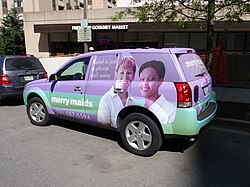 A Merry Maids service vehicle A Merry Maids service vehicle | |
| Company type | Subsidiary |
|---|---|
| Industry | Service |
| Founded | 1979; 45 years ago (1979) |
| Headquarters | Memphis, Tennessee |
| Number of employees | 8,000+ (in 2007) |
| Parent | ServiceMaster |
| Website | merrymaids.com |
Merry Maids is an international franchisor which sells and supports residential cleaning services franchises throughout the United States, Canada and the United Kingdom. Merry Maids was founded in 1979, and was acquired by ServiceMaster in 1988. In 2007, the company had 1,400 independently owned and operated franchises worldwide and over 8,000 employees.
History
Timeline
- 1979 – Merry Maids was founded in Omaha, Nebraska, by Dallen Peterson and his family.
- 1988 – ServiceMaster Brands purchases Merry Maids.
Labor relations
Several Merry Maids franchisees in the United States have been sued by their employees and by United States federal agencies for labor law violations. In 2015, the United States Court of Appeals for the First Circuit upheld an unfair labor practice order issued by the National Labor Relations Board (NLRB) against a Merry Maids franchisee, Merry Maids of Boston, in a dispute over the right of a labor union to hold a union representation election among its employees. The First Circuit ruled that the NLRB had jurisdiction in the case, and rejected the franchisee's claim that the behavior of certain employees made a fair election impossible.
Safety record
In 2015, Northampton's Merry Maids franchise was awarded a Governor’s Award for Safety Excellence by the U.S. state of Pennsylvania, with a record of no work-related injuries for over 1,580 days and no work-related fatalities in 23 years of operation.
See also
References
- ^ Rich, J.R. (2007). The unofficial guide to opening a franchise. Unofficial Guides. Wiley. p. 298. ISBN 978-0-470-13193-0.
- Ehrenreich, B.; Hochschild, A.R. (2004). Global woman: nannies, maids, and sex workers in the new economy. Henry Holt and Company. ISBN 978-1-4299-6305-3.
- ^ Vanderkam, L. (2010). 168 hours: you have more time than you think. Penguin Publishing Group. ISBN 978-1-101-43294-5.
- Zook, C.; Allen, J. (2010). Profit from the core: a return to growth in turbulent times. Harvard Business Review Press. ISBN 978-1-4221-5713-8.
- ^ Kurin, Jaclyn (2017). "A third way for applying U.S. labor laws to the online gig economy: using the franchise business model to regulate gig workers". Journal of Business and Technology Law. 12 (2, Art. 4): 193–226 – via University of Maryland Digital Commons.
- Anthony, William J.; Lewis, Jackson (n.d.). "Employment law update" (PDF). Association of Corporate Counsel. Archived (PDF) from the original on 2017-11-09. Retrieved 2017-11-09.
- Wolf, Tom; Manderino, Kathy M. (2015). Pennsylvania workers′ compensation and workplace safety 2015 annual report (PDF). Harrisburg, Pennsylvania, USA: Pennsylvania Department of Labor and Industry, Bureau of Workers’ Compensation. Archived (PDF) from the original on 2017-06-17. Retrieved 2017-11-09.